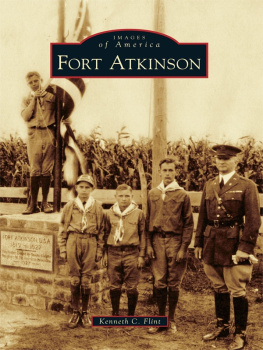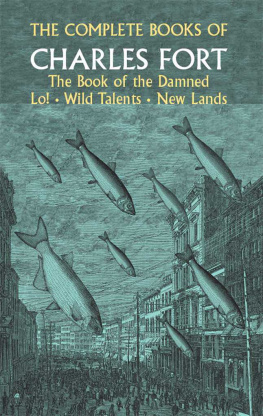Part I
1
A naked man in a city streetthe track of a horse in volcanic mudthe mystery of reindeers earsa huge, black form, like a whale, in the sky, and it drips red drops as if attacked by celestial swordfishesan appalling cherub appears in the sea
Confusions.
Showers of frogs and blizzards of snailsgushes of periwinkles down from the sky
The preposterous, the grotesque, the incredibleand why, if I am going to tell of hundreds of these, is the quite ordinary so regarded?
An unclothed man shocks a crowda moment later, if nobody is generous with an overcoat, somebody is collecting handkerchiefs to knot around him.
A naked fact startles a meeting of a scientific societyand whatever it has for loins is soon diapered with conventional explanations.
Chaos and muck and filththe indeterminable and the unrecordable and the unknowableand all men are liarsand yet
Wigwams on an islandsparks in their columns of smoke.
Centuries laterthe uncertain columns are towers. What once were fluttering sparks are the motionless lights of windows. According to critics of Tammany Hall, there has been monstrous corruption upon this island: nevertheless, in the midst of it, this regularization has occurred. A woodland sprawl has sprung to stony attention.
The Princess Caraboo tells, of herself, a story, in an unknown language, and persons who were themselves liars have said that she lied, though nobody has ever known what she told. The story of Dorothy Arnold has been told thousands of times, but the story of Dorothy Arnold and the swan has not been told before. A city turns to a crater, and casts out eruptions, as lurid as fire, of living thingsand where Cagliostro came from, and where he went, are so mysterious that only historians say they knowvenomous snakes crawl on the sidewalks of Londonand a star twinkles
But the underlying oneness in all confusions.
An onion and a lump of iceand what have they in common?
Traceries of ice, millions of years ago, forming on the surface of a pondlater, with different materials, these same forms will express botanically. If something had examined primordial frost, it could have predicted jungles. Times when there was not a living thing on the face of this earthand, upon pyrolusite, there were etchings of forms that, after the appearance of cellulose, would be trees. Dendritic sketches, in silver and copper, prefigured ferns and vines.
Mineral specimens now in museumscalcites that are piles of petalsor that long ago were the rough notes of a rose. Scales, horns, quills, thorns, teeth, arrows, spears, bayonetslong before they were the implements and weapons of living things they were mineral forms. I know of an ancient sketch that is today a specimen in a museuma colorful, little massacre that was composed of calcites ages before religion was dramatizedpink forms impaled upon mauve spears, sprinkled with drops of magenta. I know of a composition of barytes that appeared ages before the Israelites made what is said to be historyblue waves heaped high on each side of a drab streak of forms like the horns of cattle, heads of asses, humps of camels, turbans, and upheld hands.
Underlying oneness
A new star appearsand just how remote is it from drops of water, of unknown origin, falling on a cottonwood tree, in Oklahoma? Just what have the tree and the star to do with the girl of Swanton Novers, upon whom gushed streams of oils? And why was a clergyman equally greasy? Earthquakes and droughts and the sky turns black with spiders, and, near Trenton, N. J., something pegged stones at farmers. If lights that have been seen in the sky were upon the vessels of explorers from other worldsthen living in New York City, perhaps, or in Washington, D. C., perhaps, there are inhabitants of Mars, who are secretly sending reports upon the ways of this world to their governments?
A theory feels its way through surrounding ignorancethe tendrils of a vine feel their way along a trellisa wagon train feels its way across a prairie
Underlying oneness
Projections of limonite, in a suffusion of smoky quartzit will be ages before this little mineral sketch can develop into the chimneys and the smoke of Pittsburgh. But it reproduces when a volcano blasts the vegetation on a mountain, and smoke-forms hang around the stumps of trees. Broken shafts of an ancient city in a desertthey are projections in the tattered gusts of a sandstorm. Its Napoleon Bonapartes retreat from Moscowragged bands, in the grimy snow, stumbling amidst abandoned cannon.
Maybe it was only coincidenceor what may there be to Napoleons own belief that something was supervising him? Suppose it is that, in November, 1812, Napoleons work, as a factor in European readjustments, was done. There was no military power upon this earth that could remove this one, whose work was done. There came coldness so intense that it destroyed the Grand Army.
Human knowledgeand its fakes and freaks. An astronomer, insulated by his vanity, seemingly remote from the flops and frailties of everybody else, may not be so far away as he thinks he is. He calculates where an undiscovered planet will be seen. Lo!as the astronomers like to sayit is seen. But, for some very distressing, if not delightful, particulars, see, later, an account of Lowells planet. Stars are said to be trillions of miles away, but there are many alleged remotenesses that are not so far away as they are said to be.
The Johnstown flood, and the smash of Peru, and the little nigger that was dragged to a police station
Terrified horses, up on their hind legs, hoofing a storm of frogs.
Frenzied springboks, capering their exasperations against frogs that were tickling them.
Storekeepers, in London, gaping at frogs that were tapping on their window panes.
We shall pick up an existence by its frogs.
Wise men have tried other ways. They have tried to understand our state of being, by grasping at its stars, or its arts, or its economics. But, if there is an underlying oneness of all things, it does not matter where we begin, whether with stars, or laws of supply and demand, or frogs, or Napoleon Bonaparte. One measures a circle, beginning anywhere.
I have collected 294 records of showers of living things.
Have I?
Well, theres no accounting for the freaks of industry.
It is the profound conviction of most of us that there never has been a shower of living things. But some of us have, at least in an elementary way, been educated by surprises out of much that we were absolutely sure of, and are suspicious of a thought, simply because it is a profound conviction.
I got the story of the terrified horses in the storm of frogs from Mr. George C. Stoker, of Lovelock, Nev. Mr. John Reid, of Lovelock, who is known to me as a writer upon geological subjects, vouches for Mr. Stoker, and I vouch for Mr. Reid. Mr. Stoker vouches for me. I have never heard of anythingany pronouncement, dogma, enunciation, or pontificationthat was better substantiated.
What is a straight line? A straight line is the shortest distance between two points. Well, then, what is a shortest distance between two points? That is a straight line. According to the test of ages, the definition that a straight line is a straight line cannot be improved upon. I start with a logic as exacting as Euclids.
Mr. Stoker was driving along the Newark Valley, one of the most extensive of the desert regions of Nevada. Thunderstorm. Down came frogs. Up on their hind legs went the horses.
The exasperated springboks. They were told of, in the Northern News (Vryburg, Transvaal) March 21, 1925, by Mr. C. J. Grewar, of Uitenhage. Also I have a letter from Mr. Grewar.
The Flatsabout 50 miles from Uitenhagespringboks leaping and shaking themselves unaccountably. At a distance, Mr. Grewar could conceive of no explanation of such eccentricities. He investigated, and saw that a rain of little frogs and fishes had pelted the springboks. Mr. Grewar heard that some time before, at the same place, there had been a similar shower.












